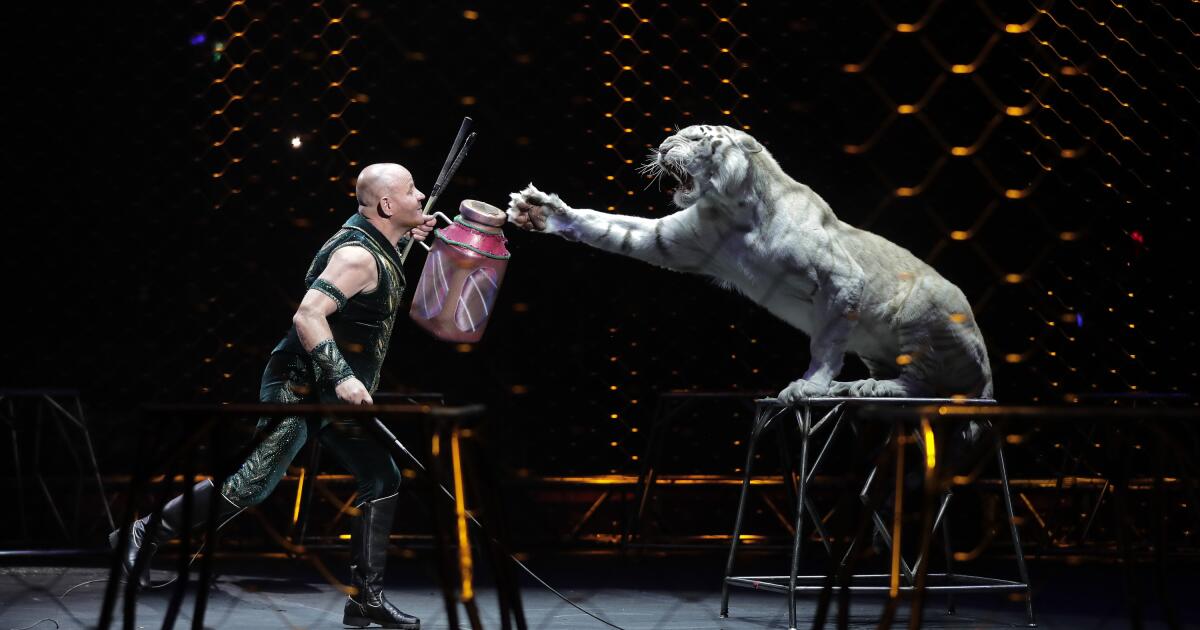Ringling Bros. and Barnum & Bailey Circus recently kicked off a new nationwide tour following a six-year hiatus. But for the first time in the show’s century-and-a-half history, there will be no elephants balancing on balls against their will, no bears forced to dance in costume and no lions and tigers corralled by tamers.
That’s a good thing. This historic shift underscores our growing national embrace of the principle that animals shouldn’t suffer for our entertainment. Beyond Ringling, however, we still have some distance to go toward fully realizing this value.
The circus wove itself into the fabric of American and European culture over the centuries with a captivating array of human performers, from clowns to acrobats, along with animals such as horses. But it wasn’t until the 19th century that wild animals such as zebras, camels and giraffes — creatures never before seen on the streets of London or New York — were shipped across oceans to boost ticket sales. Parents brought their children not only to witness breathtaking acrobatics but also for the excitement of encountering these remarkable animals up close, often for the first time.
What remained hidden from the public was the tragic mistreatment these animals routinely endured. Animals in circuses are hauled across the country in poorly ventilated trailers and boxcars for up to 50 weeks a year in all kinds of extreme weather. Basic necessities such as food, water and veterinary care are often inadequate. An investigation by the Humane Society of the United States revealed that circus animals were subjected to shockingly brutal training sessions and forced to eat, sleep and urinate within the meager confines of a 13-square-foot space.
Using dangerous, captive animals in performances also jeopardizes people, particularly children. Since the 1970s, scores have been hurt or killed by circus animals.
After decades of advocacy efforts, Ringling Bros. retired all of its elephants in 2016 before going on hiatus the following year. Its return without animals is emblematic of a larger trend: Industries that were built on animal cruelty and exploitation are redefining themselves for a more humane future.
Many industries have embraced this shift. The American commercial whaling industry is dead, replaced by a whale-watching industry that allows people to observe and learn about these magnificent creatures in their natural habitats. Greyhound racing, once popular across the country, has been banned in 42 states. And the cub-petting industry, which sells photo ops and other interactions with juvenile big cats, has suffered a major blow thanks to the hit Netflix show “Tiger King” and Congress’ Big Cat Public Safety Act, which limits public contact with and keeping of the animals.
The time has come for all industries to recognize animals as sentient beings worthy of respect and protection. We need to restrict the private ownership of wildlife species beyond big cats and prohibit their use in petting, cuddling and photo op operations, which are expanding across the country at an alarming rate and putting more species at risk.
We shouldn’t let our love of animals blind us to the reality that wildlife species used in traveling roadside zoos, animal entertainment shows and movies and television are often in distress. We’re not seeing them at their best, most natural state because they’re routinely isolated, receiving substandard veterinary care and facing potential violence. Their handlers might deprive them of food or mutilate them by removing their claws or teeth to make them compliant.
Consumers hold the power to foster more compassionate forms of entertainment and a more humane world for animals. By shunning events and businesses that exploit animals for entertainment, individuals can send a clear message that cruelty has no place in this country.
A good place to start is to steer clear of zoos and other attractions that are not accredited by the national Assn. of Zoos and Aquariums as well as any place that offers direct contact and other interactions with wild animals. There are a number of family-friendly ways to see and experience animals in accordance with our evolving ethical standards, including local, state and federal parks and forests, nature centers and animal welfare organizations with educational programs.
It’s true that for many of us, the circus was our introduction to amazing creatures. But more and more of us have come to recognize that this just isn’t the right way to experience and appreciate their majesty.
As Ringling Bros. ushers in a new era, it should serve as an inspiration to other circuses, traveling shows and entertainment businesses to champion a more humane and ethical future. This moment offers the rest of us an opportunity to embrace a vision of compassion toward animals not just under the big top but across every facet of our society.
Kitty Block is the president and chief executive of the Humane Society of the United States and the chief executive of Humane Society International and the Humane Society Legislative Fund.

